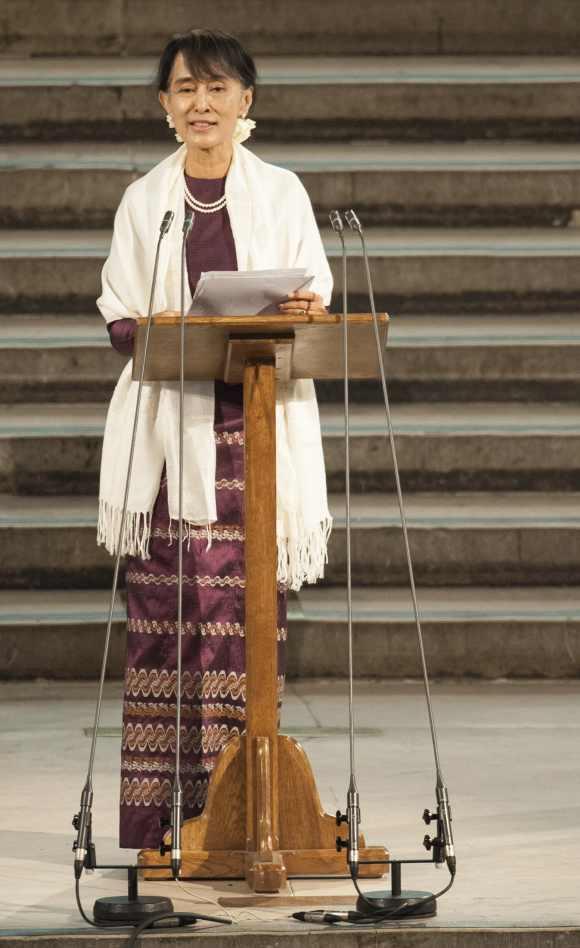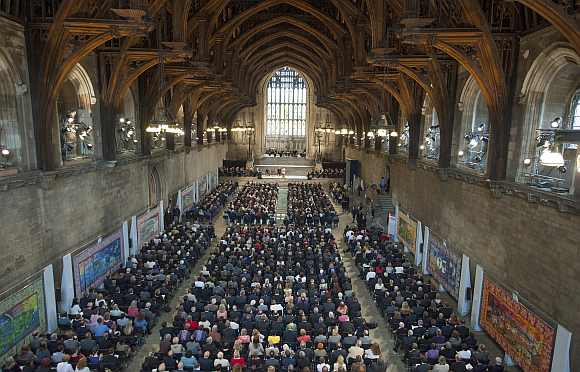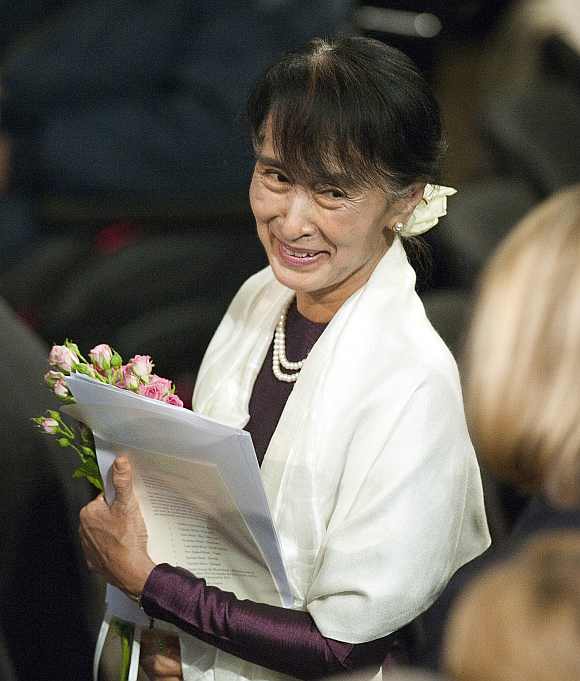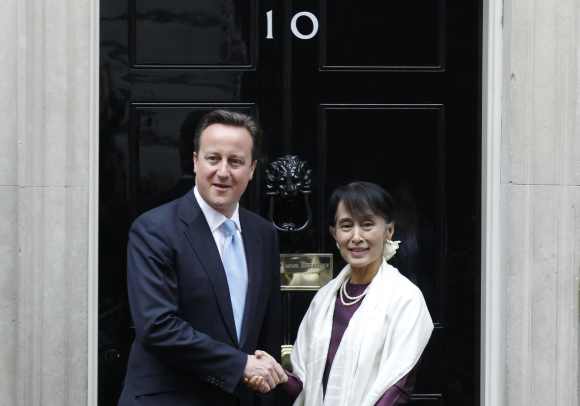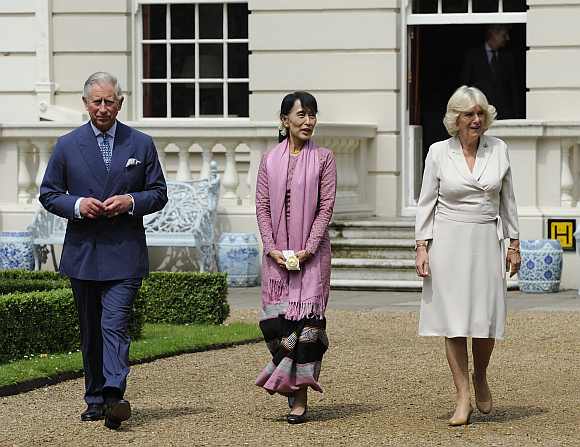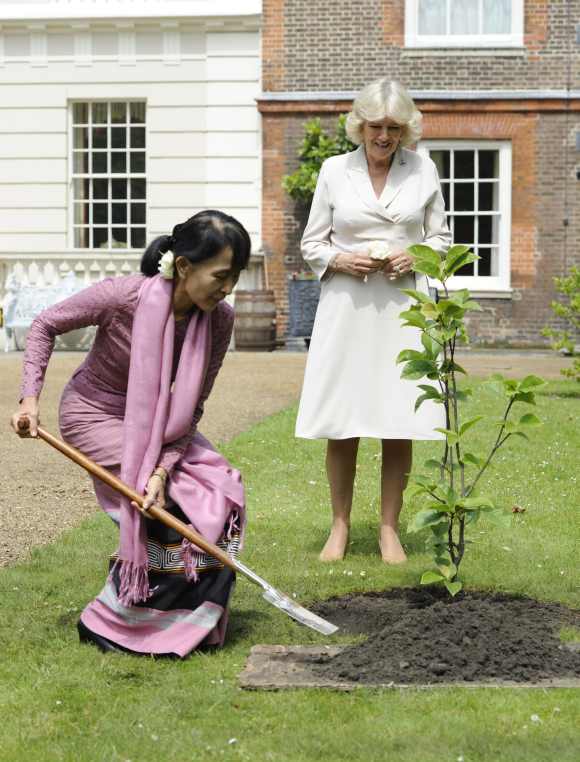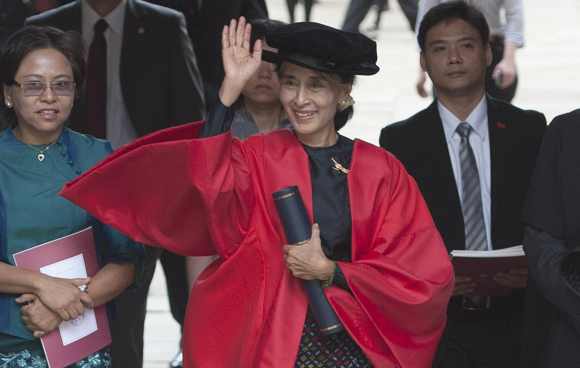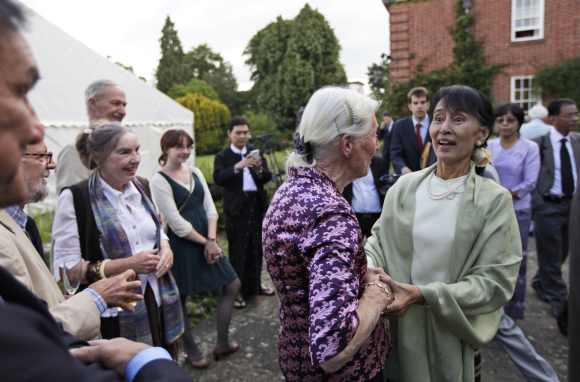 | « Back to article | Print this article |
UK rolls out red carpet for Myanmar's democracy icon Suu Kyi
Myanmar democracy champion Aung San Suu Kyi became the first non-head of state to address both houses of Britain's parliament on Thursday in a rare honour she used to ask for help in bringing democracy to the former British colony.
Seeking international help to re-establish democracy in Myanmar, democracy icon Aung San Suu Kyi on Thursday told British lawmakers that she looked forward to a time when her country's parliament would cherish freedom of speech as robustly as Westminster.
Click NEXT to read further...
UK rolls out red carpet for Myanmar's democracy icon Suu Kyi
Addressing both houses of parliament -- the first honour accorded to a woman apart from the Queen in the Westminster hall's 900-year history -- Suu Kyi recalled the contribution of her father, Aung San, in drawing up Myanmar's first Constitution in 1947, and hoped she would be able to play as "practical" a role in re-establishing democracy as her father had.
As the gathering in the historic Westminster Hall gave her a prolonged ovation, speaker John Bercow described her as the "conscience of a country" and "heroine of humanity", who had stood up against the "cabal" ruling Myanmar.
UK rolls out red carpet for Myanmar's democracy icon Suu Kyi
Suu Kyi recalled in her 30-minute speech that Jawaharlal Nehru had given her father a British army coat to deal with Britain's cold weather before he left for London to discuss Myanmar's independence with Prime Minister Clement Atlee.
She also referred to the music of sitar maestro Ravi Shankar and Mozart as helping her to endure the years of house arrest, besides the radio broadcasts by the BBC and other international radio stations.
UK rolls out red carpet for Myanmar's democracy icon Suu Kyi
Suu Kyi repeated her "tributes" to Myanmar president Thein Sein for his sincerity and commitment to the process of reform, and said if the present opportunity to re-establish democracy were missed, "it will be several decades more" before such opportunity comes again.
Earlier, speaking to newspersons after meeting Prime Minister David Cameron, Suu Kyi repeated her conciliatory approach towards the military regime by saying that "We don't want to be shackled by the past". She said it was right for the British government to invite the Myanmar president who Cameron described as "sincere" in his efforts to continue reform in the trouble-torn country.
UK rolls out red carpet for Myanmar's democracy icon Suu Kyi
Suu Kyi said after meeting Cameron, "We have reached a stage where we face the most difficult challenges, more difficult than those in the past. Now will decide what will happen in 2015 (elections)".
She added, "Our need (for international help and support) now is greater than it has ever been".
UK rolls out red carpet for Myanmar's democracy icon Suu Kyi
Cameron recalled his meeting with Thein Sein during his visit to Myanmar in April, and said the British government had thought carefully before that visit, and also before extending an invitation to him to visit the UK.
"We want to achieve democracy; it is important to work with the regime. That is why we worked to suspend sanctions on the country, not lift them, and that is the right approach.
Suu Kyi has been inspirational and an example to others in political selflessness".
UK rolls out red carpet for Myanmar's democracy icon Suu Kyi
Earlier, Suu Kyi met Prince Charles and the Duchess of Cornwall, and Foreign secretary William Hague, who described her as a "symbol of hope" for people striving for democracy.
Hague said after meeting Suu Kyi, "She is a symbol of hope to all those people around the world striving for democracy. The progress we have seen in Burma is testament to the bravery and vision shown by Aung San Suu Kyi and President Thein Sein."
UK rolls out red carpet for Myanmar's democracy icon Suu Kyi
He added, "They have embarked on a process of reform that could bring genuine democracy to Burma. The fact that Aung San Suu Kyi now feels able to leave Burma and return to the UK for the first time since 1988 is a signal to the world of how much the situation in Burma has changed."
Noting that Myanmar continued to "face many challenges, Hague said he discussed with Suu Kyi the UK's support for the reform process and desire to help the people of Burma achieve economic development, entrench the rule of law, build democratic institutions and end ethnic conflict".
TOP photo features of the week
Click on MORE to see another set of PHOTO features...
